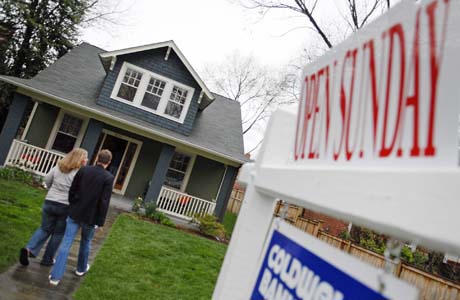Even allowing ‘mortgage helper’ suites drives up costs
Don Cayo
Sun

With taxes, levies, fees and restrictive rules adding nearly $80,000 to the cost of an average new home in Metro Vancouver, it’s easy to finger governments as the bad guys in driving housing costs sky-high. Photograph by: Reuters files
With taxes, levies, fees and restrictive rules adding nearly $80,000 to the cost of an average new home in Metro Vancouver, it’s easy to finger governments as the bad guys in driving housing costs sky-high.
But that’s just the obvious. Government influence on house prices — not all of it for wrong reasons — is far greater than that. It includes:
– Maintaining ownership of a great deal of park and other public land, which drives up the price of what’s left to develop.
– Requiring owners to withhold from development countless thousands of additional acres through policies from the ALR to provision of parking to subdivision amenities.
– Limiting density in many residential neighbourhoods.
– Subsidizing people to choose bigger homes than they might otherwise afford through residential property tax rates set far lower than the cost of service, government mortgage insurance that lets people borrow more money more cheaply than they otherwise would, homeowner grants that pay up to half the property tax bill, and tax-exempt capital gains, which makes a home (at least, one in the right place at the right time) a savvy investment as well as place to live.
– Allowing seniors and, as of April, other families to defer their property tax payments, at low interest rates, until they sell their home or die.
– Exempting owner-occupied residential land from the “highest and best use” principle generally used in assessing property values, thus allowing people to maintain single-family homes on large tracts of land that could house many more.
The collective impact of these things is huge. And the policy rationale isn’t always evident — although the political advantage it gives to the politicians in power usually is.
When it comes to how much land we devote to parks and public spaces, or even the ALR, these are public choices. There are real values to such set-asides — and real costs. The trick is to balance public wants with public willingness to pay.
But perks like artificially low tax rates, homeowner grants and tax deferrals, while popular with the beneficiaries, always wind up privileging one group at the expense of another. Tens of thousands of B.C. homeowners are shielded from the true cost of owning their homes by subsidies paid by taxpayers at large, including those who can’t afford to buy.
Policies aimed at helping keep seniors in their homes, for example, also keep a lot of “juniors” completely out of the market for centrally located single-family homes. They’re left, if they can afford to buy at all, to choose between raising the kids in a condo or committing to a long, long commute to and from the burbs.
Jock Finlayson, executive vice-president of the B.C. Business Council, points out that Ottawa’s contribution to skewed policy — the tax-free capital gains allowed on a principal residence — is just as unfair. It privileges homeowners in a handful of cities where home values are soaring over people who can’t afford to buy, or who live in slow-growth areas.
“What it does is create unearned windfalls,” he says. “Look at a city where the price triples while you live there, and somebody you went to school with in a place where the price doesn’t move. And your only effort was to stay in the house until the price goes up.”
The impact of speculators on the market, at least as judged by visibly vacant homes, seems focused on condos, and mostly in just a few neighbourhoods such as Coal Harbour.
But property tax consultant Paul Sullivan, who with his wife, a builder, keeps a particularly close eye on West Side transactions, says almost half of condo pre-sale buyers won’t ever live there, and almost a quarter flip the properties before they’re ready to occupy.
Andy Yan, an analyst and researcher at Bing Thom Architects, sees this kind of speculation as hurtful to the economy, and suggests taking a leaf from places like Hong Kong, Singapore and Australia, which have found ways to curb it. Yan suggests more focused use of the Property Transfer Tax, exempting the kinds of transactions people make as they move through a normal life cycle, but nailing speculators. And then there’s a final policy area where it’s what governments don’t do that influences housing costs in two contradictory ways. It’s the issue of the ubiquitous “mortgage helpers” — basement suites that, legally or illegally, allow buyers to purchase much more home than they could otherwise afford. These both drive up the cost of residential property (though the net result is greater affordability), and provide low-cost rental units to those who can’t afford to buy.
There’s no way to know how many of these escape the taxman’s notice. But to the extent that neither income tax collectors nor property tax assessors aggressively track these suites down, they enjoy a degree of tacit official blessing.
There is, of course, a case to be made for not cracking down on a key source of low-cost housing in such a high-cost city, or for policies that may help to keep a mix of families of different ages and stages in residential neighbourhoods.
But the point is that house prices are neither totally beyond our control, nor the fault of just one government, business or consumer group. We’ve all helped to drive them up to the level where most of us find them a strain.
© Copyright (c) The Vancouver Sun

